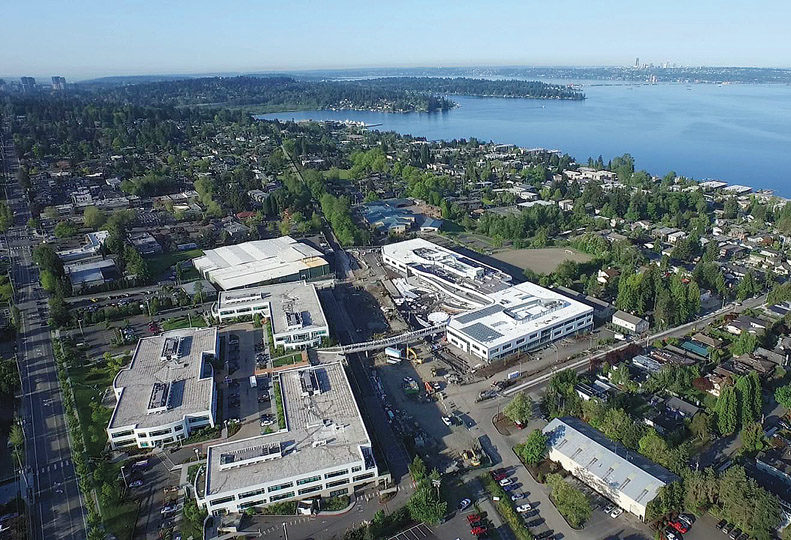
Home » SRM winds down work on big Google project
SRM winds down work on big Google project
Spokane-based company busy on Kirkland campus

June 4, 2015
Spokane-based SRM Development LLC. says it’s winding down construction of a huge expansion for Google, the big Mountain View, Calif.-based technology company, at that company’s Kirkland, Wash., engineering campus.
“It’s gone beautifully. It’s a high-profile project for SRM Development,” say Dave Tomson, SRM’s Kirkland-based development manager for the project. “It’s really been so much fun. I pinch myself coming to work every day.”
The project has included the core-and-shell construction of a curvy two-story, 180,000-square-foot building, which SRM turned over to Google in April for it to begin making its own interior improvements, and an adjoining multiuse park area that it expects to complete in July.
SRM principals have an ownership interest in an investment venture that will own the building and lease it to Google, as with the three other buildings it developed earlier on the campus, Tomson says, adding that he will be staying on there in a property management capacity.
In all, the three buildings include about 375,000 square feet of floor space, he says.
SRM is a private, investor-funded real estate acquisition, development, construction, and asset-management company. It was founded here by John Stone, Jim Rivard, Dee McGonigle, and Bryan Stone, but John Stone later transferred his interests in the company to his former partners.
In recent years, SRM has focused its efforts mostly on what Tomson describes as urban infill, apartment-over-office, and assisted-living projects.
“We really don’t do a lot of office product,” he says.
Reflecting on the Google project in terms of how it compares in scale with other projects the company has been working on, he says, “It’s right at the top of our range.”
Describing the launch of the current project—referred to as Phase II—two years ago, the Puget Sound Business Journal said the new building would have many of the perks that the company is known for. Google amenities already in place at Kirkland at that time, it said, included massage centers, a climbing wall, a dog park, and even kayak rentals for employees who want to go for a paddle on Lake Washington, about a mile west of the campus.
When the project kicked off, the Kirkland campus already was Google’s third-largest engineering center in the country, with employers there working on products including Google+, Cloud, and Chrome, the Puget Sound Business Journal said.
It said the company had more than 40,000 employees worldwide at that time, with more than 1,000 in the Puget Sound area, about 60 percent of whom worked in Kirkland. Based on a standard formula of tech companies taking 200 square feet of office space for each employee, the Kirkland expansion would accommodate about 900 additional employees, it said.
Tomson says the campus already has two restaurants that serve breakfast, lunch, and dinner, and plans call for another one on the second floor of the new building, which was constructed west of the three existing buildings, located at 747, 777, and 787 Sixth St. S., and connects to them via a skybridge.
The new building includes a 10,000-square-foot deck on the roof that looks out over Lake Washington, and the deck is bordered on two sides by green space, with solar-energy panels also occupying some of the roof space, Tomson says.
The new building, which is L-shaped and 600 feet long, has been constructed to LEED platinum standards, the highest level certified through the highly regarded Leadership in Energy and Environmental Design program, he says.
“I’d describe it as sleek. It’s a very modern, very rich-looking facility,” he says.
He says the building was designed to have differently designated interior zones, include a mountain zone, forest zone, valley zone, and sound zone, and the valley zone even has a workspace that looks like a bird’s nest.
The earlier-constructed, three-building phase of the project has amenities that also include areas for various sports and exercise activities, and the new structure will as well, he says.
“Everything is unusual. It’s all about amenity space,” he says.
The park is being developed on land between the first- and second-phase buildings, along part of what’s called the Cross Kirkland Corridor that’s being created out of a seven-mile stretch of old railroad right-of-way bought by the city of Kirkland. It will include a basketball court, adult fitness and kids’ play areas, and picnic areas, and will be rededicated back to the city once improvements there are complete, Tomson says.
SRM Development hasn’t disclosed cost figures for the project, but Tomson says Google representatives have been great to work with in giving SRM latitude as it strived to create the amenity-rich work environment Google was looking for.
“They think so far out of the box that nothing is off the table until they take it off the table,” he says, adding, “It’s really being the most unusual and crazy, but absolutely brilliant project for us.”
Another big, recently completed SRM Development project, he says, is the Astro Apartments, which is located across from the Key Arena and Seattle Center and includes 212 apartments, 11,000 square feet of commercial space, with 238 parking stalls.
The building features a mid-century, neo-retro design that’s intended to fit uniquely into Seattle’s lower Queen Anne neighborhood, SRM’s website says.
It says the amenities there include a dog walk/wash station, fire pit, rooftop bocce court, a “Skylounge” with barbecues, Galaxy Theater, full kitchen in the common area, fitness center, and electric vehicle charging stations.
The Astro rooftop deck offers views of the Space Needle, Seattle skyline, Mount Rainer, Puget Sound, and the Olympic Mountains.
Latest News Health Care Technology
Related Articles



